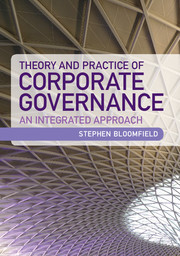Description
Theory and Practice of Corporate Governance
An Integrated Approach
Author: Bloomfield Stephen
Based on extensive practical and academic experience this textbook explains how the real world of corporate governance works.
Language: English
Subject for Theory and Practice of Corporate Governance:
Approximative price 53.83 €
In Print (Delivery period: 14 days).
Add to cart
Theory and Practice of Corporate Governance: An Integrated Approach (paper)
Publication date: 02-2013
440 p. · 17.4x24.7 cm · Paperback
Publication date: 02-2013
440 p. · 17.4x24.7 cm · Paperback
Approximative price 123.78 €
In Print (Delivery period: 14 days).
Add to cart
Theory and Practice of Corporate Governance: An Integrated Approach
Publication date: 02-2013
440 p. · 17x24.4 cm · Hardback
Publication date: 02-2013
440 p. · 17x24.4 cm · Hardback
Description
/li>Contents
/li>Biography
/li>
Theory and Practice of Corporate Governance explains how the real world of corporate governance works. It offers new definitions of governance and new conceptual models for investigating governance and corporate behaviour, based on both practical experience and academic investigation. In examining the historical development of corporate governance, it integrates issues of company law, regulatory practice and company administration with contemporary corporate governance policies and structures. An extensive range of international examples, both recent and historical, is used to compare theoretical explanations of governance behaviour with practical outcomes. This book will be particularly suitable for students taking an ICSA-accredited course - giving a necessary critical view on governance, law and regulation - and will also be suitable for accountancy courses. Through utilising new conceptual models, it will stimulate debate among both theorists and practitioners looking to develop their expertise.
Part I. The Discipline of Governance: 1. The landscape and definitions of governance: the major actors; 2. Inward-facing governance; 3. Outward-facing governance; Part II. The Relationship Between Law and Governance: 4. The protection of the laws; 5. Critical governance law; Part III. Governance and the Listed Company: 6. The development of governance - the Governance Codes; 7. The 2007–8 financial crises: the failure of systemic governance; 8. Systemic governance: the Turner Review, the Walker Review and the Vickers Commission; Part IV. Governance and Regulation: 9. The company and the stock market; 10. Non-shareholder regulation of companies; 11. Changes in regulatory structures - the PRA, the FCA and the ICB recommendations; 12. Failure - the abiding characteristic of regulation; 13. Accounting for profits: the root of information asymmetry; 14. Reward and performance; Part VI. Counter-Governance: Failures of Governance and Corporate Failure: 15. Counter-governance (1): theory; 16. Counter-governance (2): abuse of stakeholders; 17. Concluding remarks; Bibliography; Index.
Stephen Bloomfield leads the Corporate Governance Unit at Anglia Ruskin University. He is a Visiting Fellow in Corporate Governance at Kingston University and London South Bank University and prior to his academic career, he was a stockbroking analyst and then a director of a major venture capital fund. He has been a director of numerous venture capital funded companies and is a Fellow of the Institute of Chartered Secretaries and Administrators.
© 2024 LAVOISIER S.A.S.




